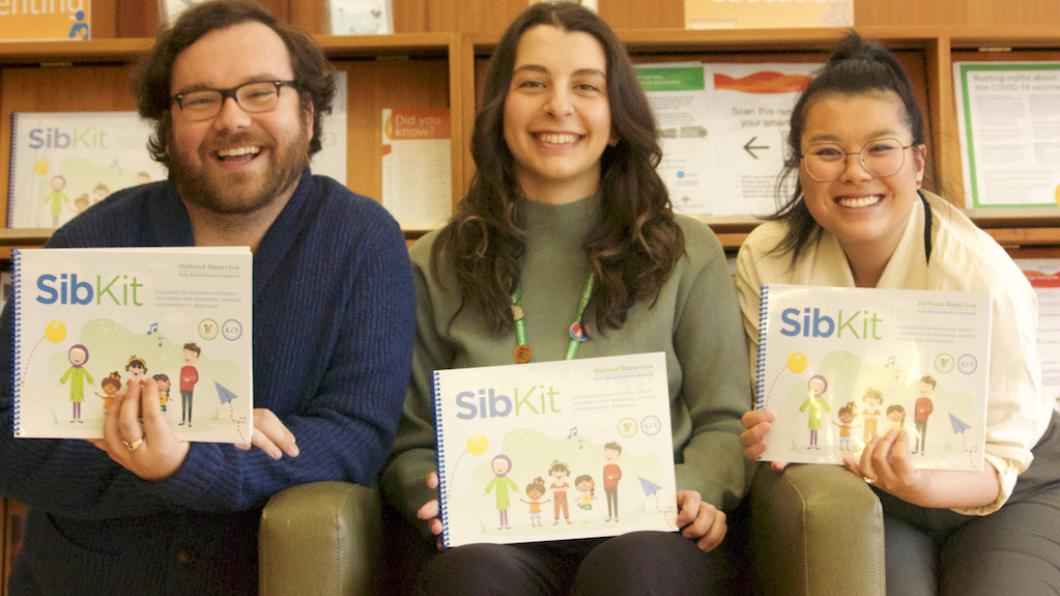
When your sibling has a disability, you may feel overlooked. This online tool is for you
By Louise Kinross
Siblings of children with disabilities and chronic conditions may feel left out when their parents focus on the extra care needs of their brother or sister. They may worry about their brother's or sister's wellbeing, or be on the receiving end of schoolyard questions or teasing.
SibKit is an interactive online booklet designed by siblings at Holland Bloorview and created just for them.
"We see you, you matter and what you're going through is okay" is the message, says Daniel Scott, Holland Bloorview outpatient playroom administrator and a sibling himself. "We wanted to affirm that the things siblings feel are normal and acceptable and lots of people feel the same way. This is a tool that will help them deal with their emotions."
The booklet opens with an introduction to animated characters who are based on real siblings at Holland Bloorview, and who lead participants through each section. All About Me "puts the focus back on siblings and their strengths," says Victoria Rombos, a research assistant in Holland Bloorview's Autism Research Centre who helped develop it. She, too, has a sibling with disabilities.
"Then there's a section on the body and a glossary of words and descriptions of diagnoses," Victoria says. "We also go through equipment their sibling may use, and a child life specialist made sure it was conveyed in child-friendly and accessible language. There are activities that get siblings thinking about how they're the same and different from their brother or sister. Then it grows into broader topics like how to deal with emotions, how to share their story, and even thinking about the future."
A section called My Story encourages siblings to think about how they would explain their brother's or sister's diagnosis, and their own feelings about it. They are encouraged to "set boundaries" with how they share information, says Melissa Ngo, a Holland Bloorview family support specialist and sibling. "It's important for siblings to know that not everyone is entitled to their story," she says. Siblings can try out a variety of responses to intrusive questions such as "That's none of your business" and "Thank you, but I'd rather talk about that in private."
Daniel, Victoria and Melissa wanted to work on this project because "this is a resource that could have helped all three of us when we were kids," Melissa says.
SibKit includes tips for siblings, parents and professionals, as well as related books, websites and support groups. Some can be accessed through QR codes you can scan with a smart phone.
SibKit may "help alleviate some guilt parents feel when it comes to not knowing how to support their child who is the sibling," Victoria says. " We hope it will act as a tool that parents can refer to, whether it is introducing the tool to their child, or going through it together."
For 25 years, Holland Bloorview has offered support groups and panels for siblings, and SibKit was an opportunity "to take the work we've done and put it into something that can live beyond these walls and be universal and accessible," Daniel says. The toolkit is free, and it's anticipated siblings will "refer back to it for information and resources over time," Melissa says.
SibKit was modified from an earlier version that was tailored specifically to siblings of children with acquired brain injury. Young brothers and sisters and those in their teens were part of the SibKit design and review process. "The activities are simple enough that anyone can do them, but not so simple that teens or youth might feel excluded, or that it was too young for them," Daniel says. The project was supported by Holland Bloorview Foundation and the hospital's Centre for Leadership.
Like this story? Sign up for our monthly BLOOM e-letter. You'll get family stories and expert advice on raising children with disabilities; interviews with activists, clinicians and researchers; and disability news: https://bit.ly/3IIK5Qo.